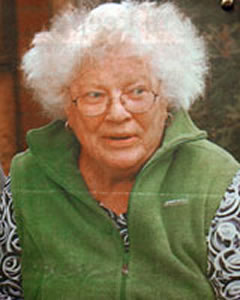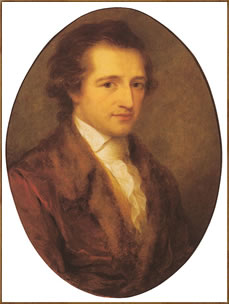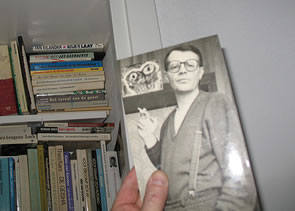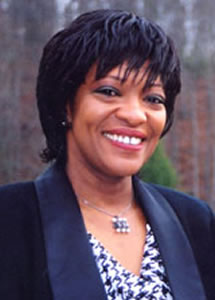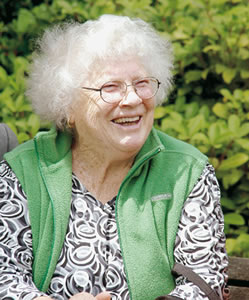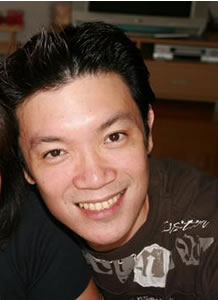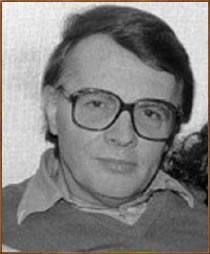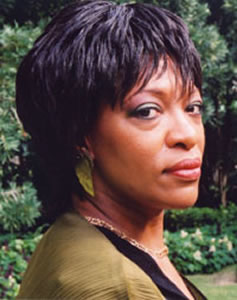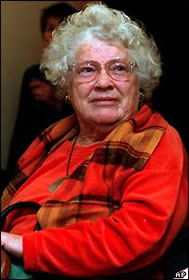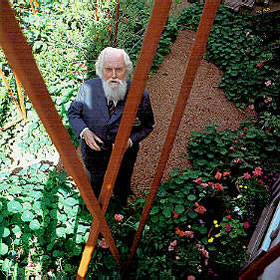De Duitse dichter en schrijver Johann Wolfgang von Goethe werd geboren op 28 augustus 1749 in Frankfurt am Main. Zie ook mijn blog van 31 augustus 2006 en ook mijn blog van 28 augustus 2007 en ook mijn blog van 28 augustus 2008 en ook mijn blog van 28 augustus 2009.
Uit: Faust I
“Nacht.
In einem hochgewölbten, engen gotischen Zimmer Faust,
unruhig auf seinem Sessel am Pulte.
FAUST:
Habe nun, ach! Philosophie,
Juristerei und Medizin,
Und leider auch Theologie
Durchaus studiert, mit heißem Bemühn.
Da steh ich nun, ich armer Tor!
Und bin so klug als wie zuvor;
Heiße Magister, heiße Doktor gar
Und ziehe schon an die zehen Jahr
Herauf, herab und quer und krumm
Meine Schüler an der Nase herum-
Und sehe, daß wir nichts wissen können!
Das will mir schier das Herz verbrennen.
Zwar bin ich gescheiter als all die Laffen,
Doktoren, Magister, Schreiber und Pfaffen;
Mich plagen keine Skrupel noch Zweifel,
Fürchte mich weder vor Hölle noch Teufel-
Dafür ist mir auch alle Freud entrissen,
Bilde mir nicht ein, was Rechts zu wissen,
Bilde mir nicht ein, ich könnte was lehren,
Die Menschen zu bessern und zu bekehren.
Auch hab ich weder Gut noch Geld,
Noch Ehr und Herrlichkeit der Welt;
Es möchte kein Hund so länger leben!
Drum hab ich mich der Magie ergeben,
Ob mir durch Geistes Kraft und Mund
Nicht manch Geheimnis würde kund;
Daß ich nicht mehr mit saurem Schweiß
Zu sagen brauche, was ich nicht weiß;
Daß ich erkenne, was die Welt
Im Innersten zusammenhält,
Schau alle Wirkenskraft und Samen,
Und tu nicht mehr in Worten kramen.
O sähst du, voller Mondenschein,
Zum letzenmal auf meine Pein,
Den ich so manche Mitternacht
An diesem Pult herangewacht:
Dann über Büchern und Papier,
Trübsel’ger Freund, erschienst du mir!
Ach! könnt ich doch auf Bergeshöhn
In deinem lieben Lichte gehn,
Um Bergeshöhle mit Geistern schweben,
Auf Wiesen in deinem Dämmer weben,
Von allem Wissensqualm entladen,
In deinem Tau gesund mich baden!

Johann Wolfgang von Goethe (28 augustus 1749 – 22 maart 1832)
Buste van Alexander Trippel in de Anna-Amalia-Bibliothek in Weimar
De Nederlandse schrijver A. Moonen, (spreek uit: ‘a-punt-moonen’) werd geboren in Rotterdam op 28 augustus 1937. Zie ook mijn blog van 31 januari 2007 en ook mijn blog van 28 augustus 2007 en ook mijn blog van 28 augustus 2008 en ook mijn blog van 28augustus 2009.
Uit: Levensvreugde
„Tenslotte belandde hij op de ‘s-Gravendijkwal van zijn woonplaats (Rotterdam). Een verouderde wel wat van een open gevangenis weghebbende dependance. Hij kreeg een tweepersoons slaapkamer twee hoog. Dag en nacht klonk het opbeurende lawaai van doorgaand verkeer uit en naar de Maastunnel. Binnen de recreatieruimtes vernam hij Skyradio met ordinaire zangstemmen en optimistische reclames en praatjes.
Zeer besteed aan het gewone volk plus medepatiënten schijnbaar, doch een ware hel voor zijn zich traag herstellend gemoed. Er was een rookhok met uitzicht op een binnenplaats. Feitelijk sinds zijn longontsteking tot de niet-rokers behorend voor ruim een maand, kwam hij in de verleiding af en toe een sigaret te bietsen. Eerst werd hij daar misselijk van, allengs echter ging dat over, zeker naarmate hij er diverse zelf gekochte pakjes op liet volgen. Van zijn vroegere sprankelendheid was niks meer over. Hiervoor in de plaats was een via lithiummedicatie getemperde desgeïnteresseerde stemming gekomen. Twee grote witte tabletten moest hij zelf beneden komen ophalen rond tien uur ’s avonds, terwijl hij toch al uren lang in bed wezenloos het verkeerslawaai lag te beluisteren.
Kortom, hij zakte in een uitzichtloze diepte weg.
Nog in de kliniek te Capelle verblijvend, mocht hij op een avond zich naar zijn huisadres begeven per openbaar vervoer. Maar hij bezat geen huissleutels. De groene gordijnen waren gesloten. Noch de bovenbuurman bleek thuis, noch de zich over zijn katten ontfermd hebbende overbuurman. Ontmoedigd liep hij de donkere straat weer uit en belde bij de stuurman om de hoek aan. Deze leeftijdgenoot, een goeie kennis, was alweer ettelijke jaren met een veel jongere Caboverdiaanse gehuwd. Gastvrij werd hij ontvangen en zelfs door de heer des huizes vergezeld richting Capelle. Er stond een venijnige oostenwind. Het lopen werd bemoeilijkt wegens de in linkerschoen knellende pijnlijke kleine teen. Bovendien bleek hij te licht gekleed op deze barre maartse kou. De stuurman sprak hem moed in. Moeilijk bereikbaar was de kliniek en beide voetgangers wisten, na bij een bushalte vergeefs gewacht te hebben, de juiste weg niet meer.“
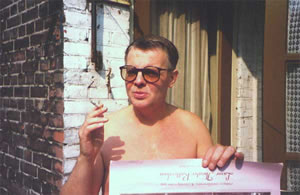
A. Moonen (28 augustus 1937 – 24 januari 2007)
De Australische dichter Frederick Alexander III Kesner werd geboren op 28 augustus 1967 in Manilla op de Filippijnen. Zie ook mijn blog van 28 augustus 2008 en ook mijn blog van 28 augustus 2009.
A web has been spun
A web has been spun
around the world
wide as imagination
making possible what
before hand took years
Many other modes of
communication and
intercourse have fallen
almost by the way side
and flies come in droves
thirsting for much more
What spider lurks we
can only conceptualise
What dangers we
can scarce visualise
But what remains as
it was in antiquated
human conversation
is that in all this closeness
in each others’ faces
we are trully still alone.
A web has been spun
around the world
wide, wild conflagration
forging herculeaic
the marriage of hearts
and souls and minds.
Bemused Rumination
Forget
the balm of barometric exuberance.
This night
no longer young, dissipates.
Recall
the dewy welcome of sun-quaffed green.
Yesterdays
revive severed umbilical dreams.
Peruse
the present with fleeting acumen.
Today
ceases yet emerges again tomorrow.
Ignite
the kindling of autumnal reticence.
Perhaps
genial kindnesses shall spring.
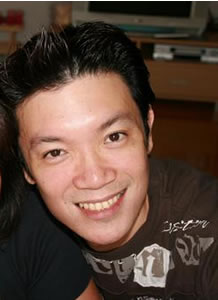
Frederick Kesner (Manilla, 28 augustus 1967)
De Amerikaanse schrijfster en dichteres Rita Frances Dove werd geboren op 28 augustus 1952 in Akron, Ohio. Zie ook mijn blog van 28 augustus 2007 en ook mijn blog van 28 augustus 2008 en ook mijn blog van 28 augustus 2009.
My Mother Enters the Work Force
The path to ABC Business School
was paid for by a lucky sign:
Alterations, Qualified Seamstress Inquire Within.
Tested on Sleeves, hers
never puckered — puffed or sleek,
Leg o’ or Raglan —
they barely needed the damp cloth
to steam them perfect.
Those were the afternoons. Evenings
she took in piecework, the treadle machine
with its locomotive whir
traveling the lit path of the needle
through quicksand taffeta
or velvet deep as a forest.
And now and now sang the treadle,
I know, I know….
And then it was day again, all morning
at the office machines, their clack and chatter
another journey — rougher,
that would go on forever
until she could break a hundred words
with no errors — ah, and then
no more postponed groceries,
and that blue pair of shoes!
Wiring Home
Lest the wolves loose their whistles
and shopkeepers inquire,
keep moving, though your knees flush
red as two chapped apples,
keep moving, head up,
past the beggar’s cold cup,
past the kiosk’s
trumpet tales of
odyssey and heartbreak-
until, turning a corner, you stand,
staring: ambushed
by a window of canaries
bright as a thousand
golden narcissi.
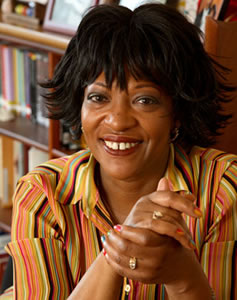
Rita Dove (Akron, 28 augustus 1952)
De Engelse dichter en literatuurcriticus Sir John Betjeman werd geboren in Londen op 28 augustus 1906. Zie ook mijn blog van 28 augustus 2009.
Verses Turned…
The church is bright with candlelight
And waiting Evensong.
A single bell with plaintive strokes
Pleads louder than the stirring oaks
The leafless lanes along.
It calls the hoirboys from their tea
And villagers, the two or three,
Damp down the kitchen fire,
Let out the cat, and up the lane
Go paddling through the gentle rain
Of misty Oxfordshire.
How warm the many candles shine
Of Samuel Dowbiggin’s design
For this interior neat,
These high box pews of Georgian days
Which screen us from the public gaze
When we make answer meet;
How gracefully their shadow falls
On bold pilasters down the walls
And on the pulpit high.
The chandeliers would twinkle gold
As pre-Tractarian sermons roll’d
Doctrinal, sound and dry.
From that west gallery no doubt
The viol and serpent tooted out
The Tallis tune to Ken,
And firmly at the end of prayers
The clerk below the pulpit stairs
Would thunder out “Amen.”
But every wand’ring thought will cease
Before the noble alterpiece
With carven swags array’d,
For there in letters all may read
The Lord’s Commandments, Prayer and Creed,
And decently display’d.
On country morningd sharp and clear
The penitent in faith draw near
And kneeling here below
Partake the heavenly banquet spread
Of sacremental Wine and Bread
And Jesus’ presence know.
And must that plaintive bell in vain
Plead loud along the dripping lane?
And must the building fall?
Not while we love the church and live
And of our charity will give
Our much, our more, our all.
Five O’Clock Shadow
This is the time of day when we in the Mens’s ward
Think “one more surge of the pain and I give up the fight.”
Whe he who strggles for breath can struggle less strongly:
This is the time of day which is worse than night.
A haze of thunder hangs on the hospital rose-beds,
A doctors’ foursome out of the links is played,
Safe in her sitting-room Sister is putting her feet up:
This is the time of day when we feel betrayed.
Below the windows, loads of loving relations
Rev in the car park, changing gear at the bend,
Making for home and a nice big tea and the telly:
“Well, we’ve done what we can. It can’t be long till the end.”
This is the time of day when the weight of bedclothes
Is harder to bear than a sharp incision of steel.
The endless anonymous croak of a cheap transistor
Intesifies the lonely terror I feel.

John Betjeman (28 augustus 1906 – 19 mei 1984)
Beeld door Martin Jennings bij St Pancras station, Londen
De Duitse schrijver en vertaler Elmar Schenkel werd geboren in Hovestadt (Westfalen) op 28 augustus 1953. Zie ook mijn blog van 28 augustus 2009.
Uit: Leise Drehung
„Scheidungen, Taufen, Firmenjubiläen. Es hatte sich wohl herumgesprochen, dass man auf mich bauen konnte, was die Bilder anging. Ich sorgte für die gute Erinnerung. Darin erkannte ich nach und nach die Aufgabe meines Lebens. Man war ja für irgendetwas angetreten, die Gene wussten Bescheid. Meine Gene sagten: Mach ihnen etwas, damit sie bestimmte Momente im Leben nicht vergessen. Gib ihnen etwas in die Hand, damit sie zumindest glauben, dass dies ein wichtiger Moment war. Mache ihnen den Moment wichtig. Ich war kein Philosoph, jedenfalls nicht in dieser neu entstandenen Vergangenheit, ich war kein Kfz-Mechaniker, ich war kein Vertreter von biologisch
geprüften landwirtschaftlichen Produkten. Alle diese Leute versuchten, den Leuten bestimmte Momente schmackhaft zu machen: gute Autos, gute Gedanken, gutes Essen. Aber eigentlich waren das alles Ablenkungen vom Augenblick. Ich dagegen sage einfach:
»Moment mal « und schon ist etwas geschehen.
» Das mag ja alles sein «, sagte Manja. » Aber wie gesagt, ich hatte den Eindruck, dass deine letzten Bilder dich irgendwie von diesen fixierten Momenten des gesellschaftlichen Lebens abgerückt haben. Auf dem letzten Bild eines Geburtstags habe ich gesehen, dass du dem alten Mann einen Zopf angedichtet hast und seiner Mamsell einen Schnurrbart. Dich scheint der Hafer zu stechen! Ich sehe dich abstürzen mit heiß genähten Flügeln aus Wachs. Also hab ich dich angesprochen, damit du wieder für die Gesellschaft im positiven Sinne produktiv wirst. «
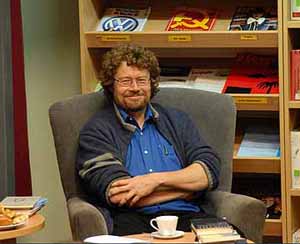
Elmar Schenkel (Hovestadt, 28 augustus 1953)
De Russische schrijver Joeri Valentinovitsj Trifonov werd geboren in Moskou op 28 augustus 1925. Nadat zijn vader in 1937 slachtoffer werd van Jozef Stalin’s zuiveringen verhuisde het gezin Trifonov echter naar een onderkomen communale woning (welke later model zou staan voor het “huis aan de kade”), tegenover het Kremlin. Tijdens de oorlog diende Trifonov bij een Moskouse vliegtuigfabriek. Van 1944 tot 1949 studeerde hij literatuur en vervolgens wierp hij zich op het schrijverschap. Trifonov staat bekend om zijn zogenaamde “stadse proza” en schetst de alledaagse problemen van het leven in de Sovjet-Unie. In de psychologische uitwerking liet hij zich sterk inspireren doos Anton Tsjechov. Bekende romans van Trifonov (ook in het Nederlands vertaald) zijn “Het huis aan de kade” (1972), “Het andere leven” (1976) en “De oude man” (1978). In “Het huis aan de kade” beschrijft Trifonov” het intellectuele klimaat tijdens de laatste jaren van Stalin’s bewind. Hij behandelt het leven van alledag van een Sovjet-geleerde die het uiteindelijk in de jaren zeventig tot een aanzienlijke post heeft gebracht. Daarnaast is het een geschiedenis van meerdere generaties in het huis aan de kade, hun vechten en compromissen, hun cynisme en illusies, hun zuiverheid en omgang, symbolisch voor een tijdperk.
Uit: Zeit des Zögerns (Bespreking van „Die Zeit der Ungeduld” door Heinrich Böll in Die Zeit, 1975)
„Eine Zigeunerin in Paris hatte dem Zaren Alexander II. prophezeit, sieben Attentate würde er überleben. Das sechste fand im Februar 1880 statt und bestätigte die Wahrsagerin: Es war dem Tischler Stepan Ghaltürin gelungen, sage und schreibe 150 Kilogramm Dynamit in das Winterpalais zu schmuggeln, und der Zar hatte diese fürchterliche Explosion überlebt. Chalturin entkam, während die Zündschnur noch schwelte; Wachsoldaten und Personal entkamen nicht. Und obwohl die Zeichen ungünstig standen (er hatte am Abend vorher beim Whist sein eigenes Bild vom Tisch gestoßen), ließ Alexander II. sich schon .wenige Wochen später, am 1. März 1880, ausfahren, um eine Parade abzunehmen und bei deiner Lieblingskusine Tee zu trinken. Wie konnte er ahnen, daß im siebten Attentat das achte enthalten war? (Ein Zwillingsattentat, das als Drilling geplant war, denn als neuntes Attentat war Scheljabows Dolchstoß in Reserve gewesen, doch war Scheljabow im letzten Augenblick verhaftet worden.) So entging der Zar dem siebten Anschlag, Ryssakows Schuß, und erlag dem achten, Grinewitzkijs Bombe, die wenige Sekunden später geworfen wurde.
Vorbereitungen und Ausführungen des geglückten Anschlags und einiger mißglückter Attentate bilden den Handlungsfaden dieses erstaunlichen Buches von —- ‘ Jurij Trifonow: „Die Zeit der Ungeduld”. Trifonow begibt sich: in die spannungsgeladene Tradition russischer „Langatmigkeit” und wird doch weder konventionell noch spekulativ. Man muß den Glücksfall der Übersetzung von Alexander Kaempfe hinzuzählen, wenn man sich fragt: was ist das für ein Land, für ein Volk, eine Sprache, die nicht nur den Stoff für einen solchen Roman vor der Tür liegen haben, sondern wo ein solcher Roman auch noch geschrieben wird? Wir sollten uns, denke ich, auf einiges gefaßt machen, nicht nur von Trifonow oder Woinowitsch. In Trif onows Roman wird vom Autor weder gerichtet noch hingerichtet; Trifonow hält sich an keinerlei Klischee, weder ideologisch noch in seinen Formalitäten. Er bietet keine Revolutionärs- Ikonographie und hält sich an kein gängiges Kritiker-Klischee, nach dem ein Roman in eine.bestimmte Kategorie zu gehören hat.“

Joeri Trifonov (28 augustus 1925 – 28 maart 1981)
De Nieuw-Zeelandse dichteres en schrijfster Janet Frame werd geboren in Dunedin en groeide op in Oamaru. Zie ook mijn blog van 28 augustus 2006 en ook mijn blog van 28 augustus 2007 en ook mijn blog van 28 augustus 2008 en ook mijn blog van 28 augustus 2009.
Uit: Towards Another Summer
„Upstairs in the attic Grace wondered at the nature of those who allow others to enter a room where their deepest secrets lie.
She sat before Philip’s huge desk, considering the drawers and pigeonholes crammed with papers and letters and the Imperial Portable typewriter on the desk with a sheet of paper thrust in it, naked for all the world to see! Somewhere in one of the drawers perhaps Philip’s novel lay typed and bound. How could he dare to give a stranger permission to enter this room! Or was this room not the repository of his secrets? Perhaps he himself had no access to his treasures; perhaps he hoarded them elsewhere without ever recognizing them; perhaps he discarded them one by one without ever having known them?
Telling herself that in spite of temptation it is not kind to explore the papers of another whether or not they are admitted secrets, Grace turned her attention to the window which was small, overlooking the golf course and the rigid death-posed trees that stood in their monumental anguish like the thorn trees that are the suicides in hell.
The room, Grace decided, would be a perfect place to write in, although not because of the view, for in writing the studied landscape is not the Holly Road back garden, the Winchley golf course; nor the Old Brompton Road, the car salesroom, the jet cotton-trails in the sky; it is some mysterious place out of the world’s depths where the waves are penetrated by the faint gleam of the drowning sun and the last spurts of light escape like tiny sparkling fi sh into the dark folds and ceaselessly moving draperies of the water; it is the inner sea; you may look from every window – in Winchley, London, New Zealand, the World, and never fi nd the Special View. Yet here, in the attic, Grace decided, little effort or encouragement would be needed to draw aside the curtains of the secret window, to smash the glass, enter the View; fearful, hopeful, lonely; disciplining o’e’s breath to meet the demands of the new element; facing again and again the mermaid’n’s conflict – to go or stay; to return through the window whose one side is a mirror, or inhabit the blood-cave and slowly change from one who gazed at the view to one who is a part or whole of the view itself; and from there (for creation is movement) when all the mirror is a distorted image of oneself, bobbing in the dark waves with stripes of light like silver and gold bars imprisoning’one’s face and body, to pass beyond the view, beyond oneself to – where?
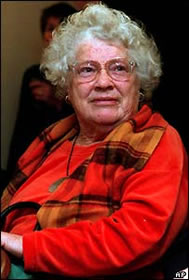
Janet Frame (28 augustus 1924 – 29 januari 2004)
De Canadese schrijver William Robertson Davies werd geboren op 28 augustus 1913 in Thamesville, Ontario. Zie ook mijn blog van 28 augustus 2007 en ook mijn blog van 28 augustus 2009.
Uit: Tempest Tost
“Though not a large place it is truly describable as a city. That word is now used of any large settlement, and Salterton is big enough to qualify; but a city used to be the seat of a bishop, and Salterton was city in that sense long before it became one of the latter. It is, indeed, the seat of two bishoprics, one Anglican and one Roman Catholic. As one approaches it from the water the two cathedrals, which are in appearance so characteristic of the faiths they embody, seem to admonish the city. The Catholic cathedral points a vehement and ornate Gothic finger toward Heaven; the Anglican cathedral has a dome which, with offhand Anglican suavity, does the same thing. St. Michael’s cries, “Look aloft and pray!”; St. Nicholas’ says, “If I may trouble you, it might be as well to lift your eyes in this direction.” The manner is different; the import is the same.”

William Robertson Davies (28 augustus 1913 – 2 december 1995)












